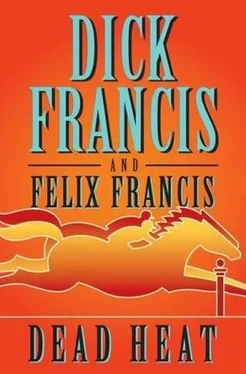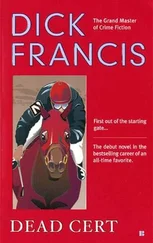“I’m so sorry,” Dorothy said to me. “I don’t seem to be myself at the moment.”
“That’s quite all right,” I said. “We shouldn’t have disturbed you. I’m sorry to have caused you so much distress. We should go.” I stood up.
“No, no,” she said. “It’s nice to have some company. Please, stay a little longer. You’ve come such a long way. And I would really like to hear more about what happened at the racetrack.”
I sat down again. I explained to her as much as I thought was prudent about the bombing at Newmarket, leaving out the gory details, and the blood. She sat bolt upright on the sofa, listening intently to every word. Once or twice, the tears welled up in her eyes, but this time she was able to maintain her composure.
“Thank you for telling me,” she said. “It has been very hard not knowing anything.”
“I’m so sorry,” I said. She smiled wanly at me and nodded.
“Will you have something to drink?” she said. “I have some ice tea in the kitchen.”
I looked at my watch. It was just after twelve. “We’d love some,” I said.
All three of us went through to her kitchen, and Dorothy poured three tall glasses of golden liquid over slices of lemon. I had always preferred my tea hot, but I had to admit that the iced version was tasty and very thirst quenching. Caroline and I sat on stools at what Dorothy called “the bar.” The kitchen was spectacular, with a great view down to the lake and the “city” beyond. The bar, in fact, was one side of a large island in the center of the huge room.
“Dorothy,” I said. “Can you think of any reason why Rolf would be a target for a bomber?”
She stopped in the middle of pouring more tea and looked at me. “The local police told me that Rolf wasn’t the target. They said he was bombed by mistake.”
“I know,” I said. “But how about if they were wrong?”
Dorothy Schumann sat down heavily on one of the stools. “Are you saying that someone may have tried to kill Rolf?”
“Yes,” I said. There was a long silence. “Can you think of anyone who might want him dead?”
She laughed, just a single titter. “Only about a thousand of the locals,” she said. “They all got fired last winter. And they all seem to blame Rolf.”
“But surely…” I said.
“No, no,” she said. “I’m not really serious.”
“But is there anyone else you could think of who might want to hurt him or damage his company?” I said.
She pursed her lips and gently shook her head.
“Do you know a man called Komarov?” I asked her.
“Of course,” she replied. “I know Peter very well. He imports polo ponies. But you’re not telling me that he has something to do with what happened to Rolf?”
“I don’t know,” I said. “I just wondered if you had heard of him.”
“He and his wife come and stay with us,” she said in a tone that implied her houseguests were beyond reproach. “They are friends of ours.”
“Lots of people have been murdered by their friends,” I said.
Et tu, Brute?
“When exactly do they stay with you?” I asked her.
“For the polo,” she said.
“At the Lake Country Polo Club?” I asked.
“Yes,” she said. “Rolf is a vice president.”
“Does Rolf have any polo ponies himself?” I asked her.
“Hundreds,” she said. “I wish he would devote as much time to me as he does to his damn polo.” She stopped suddenly and looked blankly out of the window. Life was going to be very different for her from now on.
“Is Peter Komarov anything to do with the polo club?” I asked her.
She turned back to face me. “I don’t think so,” she said. “But I do know that all his horses go there for a few days when they first arrive in the country.”
“Where do the horses originally come from?” I asked.
“South America,” she said. “Argentina, Uruguay and Colombia, mostly, I think.”
“And where do they go after they leave the polo club?” I asked.
“All over the country,” she said. “I have occasionally been to some of the sales with Rolf. You know, at Keeneland, in Kentucky, and at Saratoga.”
I had heard of both of them. They were major bloodstock sales for Thoroughbreds. “So they’re not all polo ponies, then?”
“Oh no,” she said. “I think that most are, but there are definitely some racehorses as well.”
“Why do they all come here first, then,” I said, “to the polo club?”
“I don’t really know,” she said. “But I do know they arrive by plane at O’Hare, or at Milwaukee airport, and then they go to the club by horse van. I’ve seen them being unloaded. Perhaps they need to get over the journey, like jet lag or something. I think they stay for up to a week before being shipped. Except the ones that Rolf keeps himself, of course.” She sighed, and again the tears welled up in her eyes.
“Seems strange to me not to send the racehorses directly to where they’ll be sold,” I said.
“Rolf says they have to be inspected by the vet,” she said. “And he has to do something with the balls.”
“The balls?” I asked.
“Yes,” she said. “The metal balls. They’re something to do with the journey. I don’t really know what, but Rolf always has a big box full of them here a few days after the arrival of each planeload.”
“Do you have any of these balls here at the moment?” I asked.
“I think there are a few in Rolf’s desk,” she said.
She went out of the kitchen and soon returned with a shiny metal ball about the size of a golf ball. She placed it on the counter in front of me and I picked it up. I was expecting it to be heavy, like a large ball bearing, but it was surprisingly light, and hollow.
“What are they for?” I asked her.
“I have no idea,” she said. “But I think they might be also something to do with breeding the ponies.”
“Can I have this one?” I said.
“I don’t think Rolf would be very pleased with me if I let it go,” she replied. “He’s always extremely careful to check he has the right number. He counts them over and over.”
“But it might help me find out why he was injured,” I said.
“Do you really think so?” said Dorothy, again looking so frail and forlorn.
“I don’t know, but it may.”
“Well, I suppose just one will be all right,” she said. “But you must promise to give it back after you have finished with it.”
I promised, and Caroline smiled at her.
WE LEFT the Schumann residence at five to two, having been cajoled by Dorothy into staying for a ham-and-cheese-sandwich lunch. We were late. I swung the Buick back onto I-94 and put its engine to the test. It was a hundred miles to Chicago and Caroline’s rehearsal with the orchestra at four o’clock. And she had to get to the hotel first, to collect her dress for the evening and her beloved viola. It was going to be tight.
“So what do you think this is?” Caroline asked. She sat in the car’s passenger’s seat and tossed the shiny metal ball from hand to hand.
“I have no idea what it’s for,” I said. “But if it has anything to do with Komarov, then I’m interested in finding out.” I accelerated past a huge eighteen-wheeler truck that was thundering along in the center lane.
“Don’t get a speeding ticket,” Caroline instructed.
“But you said…” I tailed off. She had said that her ass would get roasted if she was late.
“I know what I said.” She laughed. “But don’t get stopped or we really will be late.” I eased off the accelerator slightly and the speedometer came back within the limit. Well, it almost did.
“Something to do with polo ponies,” I said. “That’s what Mrs. Schumann said.”
Читать дальше












